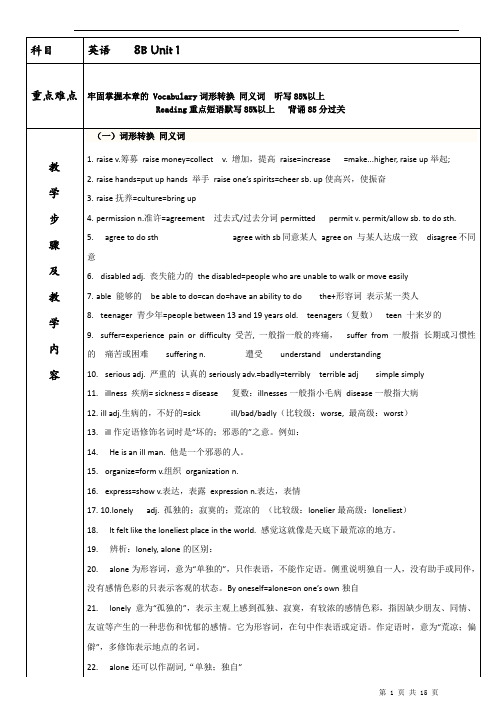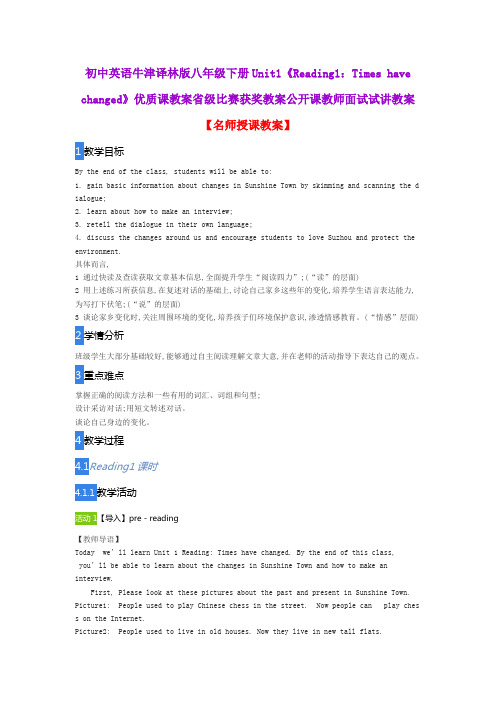八年级下册unit1reading 教案
- 格式:doc
- 大小:75.50 KB
- 文档页数:7


1 Unit 1 What’s the matter? 教材解读Go Go for for for it! it! 是以任务型语言教学为基础的英语教材,它体现“以学生为中心”和“以人为本”的教学思想,融话题、交际功能和语言结构于一体。
交际功能和语言结构于一体。
本书每个单元都列出明确的语言本书每个单元都列出明确的语言目标、主要的功能项目和语法结构、需要掌握的基本词汇,并分为Section A 和Section B 两部分。
Section A 为目标句型提供分步事例和指导性练习;Section B 使学生能够对已经学过的目标句型运用自如。
每个单元还附有Self Check 部分,此部分是让学生用来测试自己现阶段的英语水平,即对本单元的语言目标的掌握程度有较为明确的认识。
第1单元以What’s What’s the matter? the matter?为中心话题,为中心话题,让学生认知表示身体部位的单词以及部分疾病的表达方法,描述身体不适和提出建议展开,学习和运用“What’s What’s the matter? the matter?”和“”和“What should…do ”让学生学会描述身体的不适和提出建议。
?”让学生学会描述身体的不适和提出建议。
本课教材内容与学生的实际生活密本课教材内容与学生的实际生活密切相关,易于引出学生运用简单的英语进行交际和交流,易于引出学生运用简单的英语进行交际和交流,在学习活动中,在学习活动中,学生通过交换对身体不适的描述及建议,促进学生之间和师生之间的情感交流,体不适的描述及建议,促进学生之间和师生之间的情感交流,增进情谊。
同时,在学习中养增进情谊。
同时,在学习中养成良好的健康习惯。
单元目标一、知识与技能1. 1. 知识目标:认知表示身体部位的单词以及部分疾病的表达方法。
能听懂并描述日常知识目标:认知表示身体部位的单词以及部分疾病的表达方法。
能听懂并描述日常小事故的处理方法。

牛津译林版八年级下册英语Unit 1教案一、教学内容本课教材为牛津译林版八年级下册英语,Unit 1的主题是“Why don’t you talk to your parents?”。
本课将学习一般现在时的肯定句、否定句和疑问句,以及如何运用一般现在时描述习惯和经常发生的动作。
同时,学生还将学习如何用一般现在时表达喜欢和不喜欢的活动。
二、教学目标1. 学生能够听懂、会说、会读本课的生词和短语,如“often, sometimes, usually, rarely, never, brush your teeth, watch TV”等。
2. 学生能够运用一般现在时描述自己的习惯和经常发生的动作。
3. 学生能够在适当的情境中,用英语进行简单的交流,如询问和描述他人的习惯。
三、教学难点与重点重点:一般现在时的肯定句、否定句和疑问句的构成和运用。
难点:一般现在时态的运用,如何用英语描述自己的习惯和经常发生的动作。
四、教具与学具准备教具:多媒体课件、黑板、粉笔。
学具:课本、练习册、文具。
五、教学过程1. 情景引入:教师通过展示一幅图片,图片中有一个男孩在刷牙,一个女孩在看电视,引发学生对日常习惯的讨论。
2. 新课导入:教师引导学生学习一般现在时的肯定句、否定句和疑问句,并通过例句和练习让学生掌握一般现在时的构成和运用。
3. 课堂实践:教师设计一些情境,让学生运用一般现在时进行角色扮演和小组讨论,如描述自己的日常习惯,询问和描述他人的习惯等。
4. 随堂练习:教师给出一些练习题,让学生独立完成,检验学生对一般现在时的掌握程度。
六、板书设计板书内容:一般现在时肯定句:主语 + 动词原形否定句:主语 + don't/doesn't/does not + 动词原形疑问句:Do/Does/Doesn't + 主语 + 动词原形?七、作业设计1. 作业题目:用一般现在时描述你的日常习惯,并写一篇短文介绍你的朋友。

( ) 11. _______ is difficult to work out the maths problem.A.ThisB. ThatC. It( )12. We decided _______ at the end of this month.A. travelB. not start outC. to leave( )13. Let him _______ a rest. I think he must be tired after the long walk.A.hasB. haveC. to have( )14. _______the computer is a problem.A.How to useB. What to useC. Where to use9.I haven’t decided wha t (draw) for my cartoon book.10. Children under 18 years old are not allowed (drive).11. What he said made us deeply _____. (move )12. As a result of my laziness, I failed ________( finish ) my work in time.13. I am sorry ______ (not have) written you a letter at the time.14. Will you lend him a magazine _________ (read)?15. I feel tired and sleepy. Why not stop _______ (rest) for a while?语法填空Dear Mum,I’m writing this letter to talk about my worry about you. I can’t stop linking about my Dad’s death and both of us are suffering sadness. In fact, I really want to ask you (14) ____________ (not give) up being alive. All of us know that you and Dad loved each other so much. You always got up early (15) ____________ (look) after him when he was in hospital. My Dad has been away for half a year. But you still can't believe in this综合训练一、完形填空My name is Feng Guixiang. I want to tell you about the China Children and Teenagers' Fund(CCTF) and how it __1__ me.One of the CCTF's special __2__ is the Spring Bud Project. In 1989, 4.8 million children in the country, aged from seven to fourteen, were too __3__ to attend school. Eighty-three percent of them were __4__. Because of this, the CCTF launched the Spring Bud Project to help them. Since then, the project has helped millions of girls __5__ to school. It has also built a lot of schools.The very first Spring Bud class was here in Guangxi in 1989. The Spring Bud Project __6__ me to attend that class. It also rented a 7 close to the school for me. I could live in it without paying money.Before the project started, I stayed at home and helped my mother with the __8__. Going to school changed my life __9__. I learnt to read and write and do many other things.Now I __10__ a teacher at a Spring Bud school here in Guangxi. I wish to help other girls the way the Spring Bud Project helped me.1. A. hated B. helped C. accepted D. treated2. A. spirit B. difficulties C. lessons D. activities3. A. unusual B. disabled C. poor D. free4. A. girl B. students C. boys D. adults5. A. fail B. decide C. return D. walk6. A. looked for B. waited for C. lasted for D. paid for7. A. shop B. room C. car D. book8. A. housework B. teamwork C. homework D. network9. A patiently B. greatly C. carefully D. luckily10. A learn from B. care for C. talk with D. work as二、阅读理解Carly Harris is a student at University of Utah. She was travelling with her cousin in December when she saw a video on the media about a camp called Camp Moria in Greece. Then they decided to be volunteers in this camp.They tried to contact the organizer of the camp, but failed. At last, they got to the camp by themselves.Camp Moria used to be a military barrack(军营) with 700 people, but nearly 2, 000 lived there when Harris arrived in December. There, Harris’s job was to give the drenched people hot tea and dry clothes. One day, a young man in the camp told her she was very kind and thanked her very much. Harries later knew his name is Soufiane El Yassami. He is from Morocco. Many North African refugees(难民), like El Yassami, travelled across the ocean to Europe for a better life, but finally, they arrived in Lesbos as refugees, not immigrants (移民) .Harris is Mormon(摩门的), and El Yassami is Muslim(穆斯林的). They are very different in many ways. However, on Harris's last day in the camp, when El Yassami asked if he could make friends with her, she said yes. Then they became good friends and kept in touch with each other for a long time…1. What was Carly Harris doing when she saw the video about the campA. V olunteering in another refugee camp.B. Studying at University of Utah.C. Working in a social medium company.D. Travelling with her cousin.2. The underlined word "drenched" in Paragraph 4 probably means __________ in English.A. wetB. weakC. poorD. old3. What can we know about El Yassami from the passage?A. He is not Muslim.B. He thought Harris was very kind.C. He would like to work with Harris.D. He got to lesbos as an immigrant at last.4. Which of the following is true according to the passage?A. Harris had graduated from University of Utah.B. Harris succeeded in contacting the organizer of Camp Moria.C. Camp Moria should be very crowded.D. Harris didn’t want to make frien ds with el Yassami.5. In what order did the following events take place?a. El Yassami arrived in Lesbos as a refugee.b. Harris gave hot tea and dry clothes to the people in the camp.c. Harris made friends with El Yassami.d. Harris saw the Greek camp from a video on social media.e. El Yassami expressed his thanks to Harris.A. a-b-e-d-cB. a-d-b-e-cC. d-b-a-c-eD. d-a-b-c-e三、根据短文内容,从选项中选出能填入文中空白处的最佳选项,选项中有一项为多余选项。

人教版英语八年级下册Unit 1 What’s the matter?Section A 2 (3a – 3c)教材分析:本单元主要讨论的话题是询问某人的健康状况以及遇到麻烦的表达方法。
本单元涉及到大量的表示人体部分的单词以及关于身体某部位不舒服的短语。
此外,本单元还涉及到党当人身体不适时,医生、朋友或亲人提出的意见的表达法。
本单元共有阅读类文章两篇,文章的主体时态都为一般过去时。
主要句型为.What’s the matter with…?”“What should I/ you/ he/ she/they… do?”“I/ you/ he/ she/they should do…?”“I have aheadache/stomachache/toothache.” “Does she/he/ have a fever/cold/toothache…?”总的来说,本单元的相关语法知识并不难。
教学目标:1.知识目标:(1)掌握一些相关的词和词组:matter, sore, have a cold, foot, neck, stomach, throat, fever, lie, lie down, rest, cough, toothache, headache, break, hurt, passenger, get off, to one’s surprise, trouble, get into, climber, be used to, sick, risk, herself, sunburned等;(2)掌握反身代词的用法;enjoy oneself, help oneself to,(3)掌握情态动词should的用法;(4)掌握以下主要句型:. What’s the matter with…?”“What should I/ you/ he/ she/they… do?”“I/ you/ he/ she/they should do…”“I have a headache/stomachache/toothache.”“Does she/he/ have a fever/cold/toothache…?”2.能力目标:1.能够用英语询问某人的身体状况以及关心他人是否遇到麻烦;2.提高学生合作学习、自主学习的能力。

初中英语牛津译林版八年级下册Unit1《Reading1:Times have changed》优质课教案省级比赛获奖教案公开课教师面试试讲教案【名师授课教案】1教学目标By the end of the class, students will be able to:1. gain basic information about changes in Sunshine Town by skimming and scanning the d ialogue;2. learn about how to make an interview;3. retell the dialogue in their own language;4. discuss the changes around us and encourage students to love Suzhou and protect the environment.具体而言,1 通过快读及查读获取文章基本信息,全面提升学生“阅读四力”;(“读”的层面)2 用上述练习所获信息,在复述对话的基础上,讨论自己家乡这些年的变化,培养学生语言表达能力,为写打下伏笔;(“说”的层面)3 谈论家乡变化时,关注周围环境的变化,培养孩子们环境保护意识,渗透情感教育。
(“情感”层面) 2学情分析班级学生大部分基础较好,能够通过自主阅读理解文章大意,并在老师的活动指导下表达自己的观点。
3重点难点掌握正确的阅读方法和一些有用的词汇、词组和句型;设计采访对话;用短文转述对话。
谈论自己身边的变化。
4教学过程4.1Reading1课时教学活动1【导入】pre-reading【教师导语】Today we’ll learn Unit 1 Reading: Times have changed. By the end of this class,you’ll be able to learn about the changes in Sunshine Town and how to make an interview.First, Please look at these pictures about the past and present in Sunshine Town. Picture1: People used to play Chinese chess in the street. Now people can play ches s on the Internet.Picture2: People used to live in old houses. Now they live in new tall flats.。
人教版八年级英语下册-Unit1-教案教学目标- 学生能够掌握并正确运用本单元的词汇和短语。
- 学生能够熟练运用本单元所学的句型进行口语表达。
- 学生能够通过阅读和听力理解本单元的相关话题。
- 学生能够参与到小组讨论和角色扮演的活动中,进一步提高口语交流能力。
教学内容一、词汇本单元重点词汇和短语包括:environmental, influence, pollution, reduce, recycle, waste, energy, natural resources, electric, appliance等。
二、语法本单元主要研究以下句型:1. It's important to + 动词。
例如:It's important to protect the environment.2. What should/could we do to + 动词?例如:What should we do to reduce pollution?三、听说读写通过听力活动和阅读材料,让学生了解有关环境保护的知识,并提高他们的听说读写能力。
四、口语交流组织小组讨论和角色扮演的活动,让学生通过对话的方式进行口语练,提高他们的口语交流能力。
五、拓展活动邀请环保专家或相关领域的人士来学校进行讲座,让学生进一步了解环保知识,并激发他们保护环境的意识和行动。
教学步骤第一课时1. 导入新课,介绍本单元的话题。
2. 学生听音,跟读词汇和短语。
3. 听力练,让学生根据听到的对话内容选择正确的图片。
4. 提出问题,让学生讨论并说出不同的解决办法。
第二课时1. 复上节课的内容,让学生回顾所学的词汇和句型。
2. 阅读活动,让学生阅读课文,并回答相关问题。
3. 角色扮演,让学生根据课文中的对话内容进行角色扮演。
第三课时1. 复上节课的内容,进行口头测试,检查学生对所学内容的掌握情况。
2. 小组讨论,让学生分组讨论如何保护环境,并给出建议。
8B Unit1 Past and present8B Units1导学案参考答案Unit1第一课时:一、1.was 2.has eaten 3.to have 4.to play 5.is eating 6.took 7.rode8.will be二、1.would like , grows up 2.walks to school 3.goes to work by bus 4.flies to5.don’t want to any more第二课时:一、1.know about 2.get married 3.move out 4.water pollution 5.in the centreof6.feel lonely7.turn into8.from time to timeed to do 10.in some ways二、well has lived southern got married in the centre of children has changed a lotmarket stallsHas turned into to play cards pleasant shoe factory waste waterfish and plants polluted took action cleaner in some ways open space lonely第三课时:一、1. I don’t want to play with you any more.2.There used to be the home of birds.3.He live in Beijing since he moved here.4.In the past ,many people had no money to go to school.5.Nanjing has changed a lot in the past five years.6.Many friends have moved to other places ,so I feel lonely from time to time.7.I had an interview with my Chinese teacher this morning.8.It has bee more difficult to play chess with my old friends.二、1.Where have they gone ..2.How long has lived3.When was born4.you helping me第四课时:一、1.dishonest 2.unhappy 3.unlucky 4.impolite 5.unkind二、D C C B C A三、1.cheaper 2.healthiest 3.impossible 4.safely 5.well better第五课时:一、1.They haven’t read the book yet.Have they read the book yet? Yes, they have/ No , they haven’t1.How long has Daniel stayed in Shanghai?2. I have known him for ten years.3.Sandy has been in Beijing for half an hour.二、1. Have seen have did see2.lent hasn’t given 3.have been did visit第六课时:一、C C A A D B二、1. He has already finished homework.2.Have you ever been to Beijing?3.I have known Linda for 3years.4. I have just seen Lily.5.We haven’t heard from him for a long time.第七课时:一、1.is 2.do 3.will be 4.shall go 5.taught 6.has taught 7.has gone8.Have seen 9.have learned 10.will arrive二、1.How long have you known him?2.Has Jane finished her homework?3.I haven’t worked in this school for two years.4.Why hasn’t Jim finishedhis homework?5.when did you buy this watch?6.Who is the old man next to Lily?7.Which girl is my sister?8.How far is your home from your school?第八课时:一、1.advantages 2.reduce 3.changed 4.developments 5.service6.interview7.realizes 9.repair二、1.recently 2.unpleasant 3.impolite 4.have done 5.left6.southern7.polluted8.Has arrived arrived9.has eaten 10.have been第九课时:第十课时:一、1.as often as before 2. have an interview with sb ed to do sth 4.so big and modern5.in the north of二、1. was has lived 2.was made 3.Has arrived arrived 4.has eaten5.safely6.has been7.have been三、1.B 2.C 3.B 4.C 5.D 6.A四、1.Have you anything 2.doesn’t provide any longer 3.since ago ed to5.has been to。
8aunit1friendsreading教案一、教材分析:8A Units 1-3是牛津英语教材体系中很重要的一个模块,是关于青少年生活(teenage life)的,其内容更贴近学生的现实生活,容易引起学生的兴趣和共鸣。
本课属于Unit 1 Friends的reading部分的第一课时(reading部分一般分两课时进行教学:第一课时以阅读和理解为主;第二课时以知识点和词汇的分析掌握为主)。
牛津初中英语系列教材按“话题—功能—结构—任务”相结合的原则编写,并力求使这四个方面在比较真实的情景中紧密联系、融为一体综合运用。
本单元围绕“朋友”这个话题展开教学,引入大量的形容词来描述朋友的外貌、性格、能力等特征,所以运用描述性形容词的功能来刻画人物特征是本单元的中心任务。
而且本单元的Grammer重点学习形容词的比较级和最高级用法正是对这一中心任务的扩展和补充。
整个单元的结构安排十分合理,各部分相互渗透,Reading部分提供了三个具有不同外貌、个性、能力和理想的青少年Betty,Max,May作为学生学习的对象。
其实他们就是学生身边很具有代表性的个体。
从他们身上能找到自己最向往的好朋友应该具备的良好品质,同时激励每个学生培养优点,克服缺点,争做人人喜欢的愿意交往的好学生。
如此丰富、有感召力的话题激发了学生浓厚的兴趣和积极的参与意识,为教学活动的展开提供了优秀的情感基础。
同时学生在通过课堂的学习后回到生活中有“随手可得”的谈话资料。
这样的设计充分体现了牛津英语教学源于学生生活经验并紧密联系学生生活实际的理念。
二、学情分析:1、年龄特点:八年级学生大部分是处于14、15岁左右的学生,处于生理、心理高速发育时期--青春期。
这时的学生渴望得到关心,希望得到别人的尊重和肯定;既渴望交朋友,又不会处理同学关系,因此表现得敏感多疑、固执、脆弱而且情绪易波动;青春期的孩子一方面认为自己长大了,想摆脱家人和老师的约束,另一方面又缺乏自控力、判断力,容易受外界的干扰;他们活泼好动,参与欲、表现欲非常强烈,但也有小部分学生性格孤僻、自卑内向、胆小;相当多学生较懒惰、贪玩,学习目的不太明确,对学习抱着单纯的求趣心理,追求知识要符合自己的兴趣,容易感情用事,对于自己感兴趣的东西就认真学,不感兴趣的就不学。
主备人李书平上课时间课题 8A Unit1 Friends Reading(1)学习目标知识目标:初步理解与本单元主题相关词汇能力目标:通过阅读了解文中所出现的三个好友的基本情况;理解用形容词来描述朋友外貌和个性品质的语篇。
情感目标:学会欣赏别人, 学会珍爱友谊。
学习重点学会使用正确的阅读技巧进行文本解读,获取关于文中三个好友外貌与个性特征的主要信息。
学习难点学会使用正确的阅读技巧进行文本解读,获取关于文中三个好友外貌与个性特征的主要信息。
自学质疑一、找出重要的语言知识点(单词、短语、句型和语法),查词典和有关资料解释其意义及用法,举例句或例题。
重点预习并记住下列单词generous 大方的willing 乐意的 ready 乐意的 round 圆形的smart 聪明的sense 意识 humour 幽默 bored 无聊的 true 忠实的二、根据首字母和句意写出单词1. He’d like to share everything with his friends. He is g____________.2. She never tells lies(说谎). I believe what she says. We all think she is very h________.3. He can always help me with my problems. I can go to him when I am in trouble. He is very h_________.4. She does well in singing and dancing. She is a m _________ girl.5. I can tell her anything and she keeps my secrets. She is a t__________ friend.6. He is good at telling jokes. He often makes us laugh. He has a good sense of h__________三、预习课文内容,尝试着判断下面的几句话是否正确1.Betty is generous to old people only.2.Betty wants to be a singer and travel around the world.3.Max does a lot of computer work.4.Max is very good at telling jokes.5.May is a true friend.6.May likes to tell others her friends’ secrets.课堂交流展示一、对课前自学中的重要的语言知识点(单词、短语、句型和语法)在组内和班内展示。